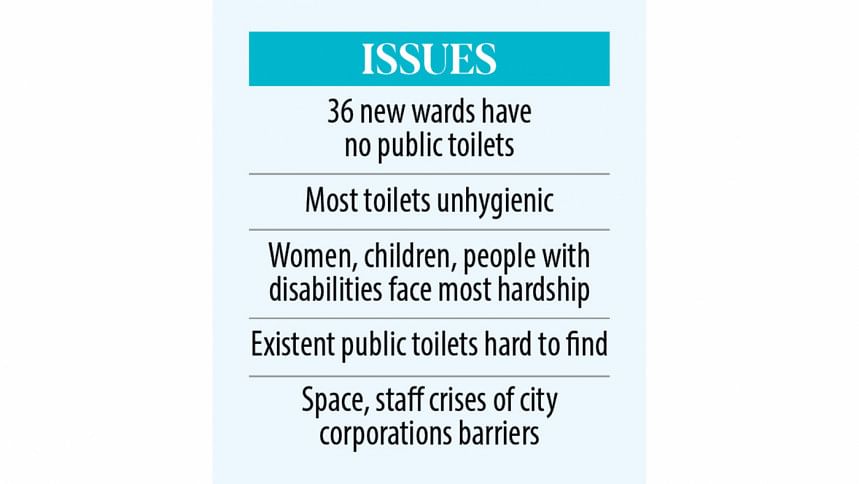Only 103 public toilets for 1.78cr residents

The two city corporations of Dhaka have a total of only 103 public toilets for 1.78 crore people. These toilets are scattered across 129 wards. If that wasn't bad enough, in 36 of the new wards, there is no sign of this essential facility.
Due to this grave crisis, residents have to face many difficulties. The number of toilets is not only insufficient, but most of them are also unhygienic, said residents.
Women, children, and people with disabilities must endure greater hardships while travelling. They are putting their health in danger as well, since holding in urine for a long time can lead to different kinds of illnesses, they said.
Ensuring clean, accessible sanitation is a core part of Sustainable Development Goal-6. World Toilet Day, which is observed on November 19, was initiated to inspire action to tackle the global sanitation crisis and reach SDG-6 by 2030.
Three years ago, Sagor Hossain (45), a resident of Tejturi Bazar, started a job as a marketing officer for a private company. Due to his work, he has to spend most of the day away from home. And he rarely finds a public toilet on his way.
This problem took a toll on Sagor. He was hospitalised multiple times with urinary tract infections right after joining work. Now, he uses the toilets of commercial and medical facilities, which are not public toilets, lest he suffer from the same fate.
"People in this city don't get any city corporation facilities. Even a necessity such as a toilet is neglected,'' said Sagor.
Salma Begum, a resident of Mirpur-1, said even the toilets that exist are hard to find. Besides, their condition is not suitable for women.
"While returning from work, I have to wait for public transport. When I have to wait for a long time, I eventually have to use a public toilet. But most of them are dirty or unusable," she said.
Mobasher Hossain, a resident of Fakirkhali (ward 75), under Dhaka South City Corporation (DSCC), said, "There are no public toilets in our ward. So, around 5,000 people are suffering."
"Some people are even openly defecating," he said.
This correspondent also spoke to 20 other residents who echoed the same issues.
Moushumi Akhter Shoma, caretaker of a public toilet at Panthapath, said around 200 people use the toilet daily, and among them, only five to seven are women.
"Even though there are special facilities for women and people with disabilities, they come less often," she said.
Momotaj Begum, caretaker of the public toilet at Tejgaon Railgate, said that women come less often than men. Over 300 men use the toilet, as opposed to 50 women.
Adil Mohammed Khan, professor of Jahangirnagar University's urban and regional planning department, said in the last five years, only a few public toilets that meet the demands of residents have been built.
"Only city corporations can solve this problem," he said, suggesting that the corporations can classify toilets of mosques and markets as public toilets so that people can freely use them.
"People are holding in their urine, because of insufficient public toilets. So, they are suffering from various illnesses," he added.
Contacted, DNCC spokesperson Mokbul Hossain said DNCC has 50 public toilets and is constructing 50 new ones. Out of the new ones, 37 toilets have already been built.
All works might be finished in December, he said.
"The citizens will benefit if all the toilets are built by December. The toilets that need renovation are also being modernised consistently," he said.
Sufiullah Sididik, supervisor engineer of DSCC, said public toilets are being built in every ward. Space and staff crises are the corporation's barriers.
The number of employed people in the city is increasing, so new public toilets are being built.

 For all latest news, follow The Daily Star's Google News channel.
For all latest news, follow The Daily Star's Google News channel. 



Comments